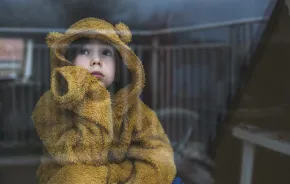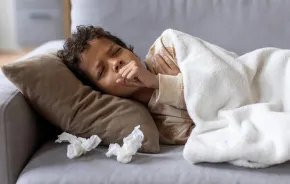
It’s that time of year again: The school year has started, and even though kids and parents are excited to get back to in-person learning after a difficult year of remote school, the start of school can be a stressful time for children, especially those with mental health challenges.
For me, back-to-school time brings back a lot of memories and emotions. Five years ago, my middle daughter Nina was about to start her sophomore year of high school. During the spring and summer, we discovered Nina was suffering from severe depression. By the time she was diagnosed, Nina had been suffering in silence for at least five years. As the school year got closer Nina was also diagnosed with social anxiety. The thought of school — walking the cramped hallways, eating in the crowded cafeteria, adjusting to new teachers — was overwhelming to her. We thought we were doing all the right things to support her: Counseling, medication and communication with school administrators. To try and keep her safe we’d even resorted to taking the door off her bedroom and had her sleeping on a mattress in our bedroom.
Tragically, it wasn’t enough. We lost Nina to suicide nine days into the school year, on Friday, September 16, 2016.
I miss Nina dearly every second of every day.
September is Suicide Awareness Month. Nationally, suicide is on the rise among teens and young people ages 15–24. And, unlike adult suicide rates, which rise in summer each year, teen suicides spike during back-to-school season. By sharing my family's story, I hope others affected by suicide or mental illness will know that they are not alone.
Since losing Nina, our family has worked to honor her by partnering with the American Foundation for Suicide Prevention (AFSP) to try to create a world without suicide.
For the past five years I have also created "Team Nina" to participate in the annual AFSP Out of the Darkness Community Walk that takes place in hundreds of cities across the country. Through "Team Nina," money raised goes toward research, educational programs and advocacy for public policies in mental health, and toward suicide prevention and support for survivors of suicide loss.
What parents can do
Even after losing Nina, I still believe that each of us can make a difference in saving lives. As parents we focus so much on healthy eating habits, exercise and sleep. But, mental health is just as critical. According to the American Foundation for Suicide Prevention, it is so important to remember to talk and really listen to our children about how they are feeling: “Don’t be afraid to have a conversation with your child about mental health and suicide. Ask your child how they’re doing, what’s happening in their world these days, and what their concerns are. It can start simply by asking, ‘Are you okay?’”
Listen intently and without judgment. Ask open-ended questions and resist the urge to offer quick fixes or solutions to their challenges, which tends to shut down further dialogue. Validate and support their feelings.
Follow their cues, and say things like, “Tell me more about that. I’d love to understand more about what that’s like for you."
For a young child, you can ask about physical symptoms like stomach aches, and watch for changes in feelings like getting more upset or angry than usual. If it seems to you that they feel hopeless, trapped or overwhelmed, then ask if they ever think about hurting themselves or ending their life.
Always remember, if you, your child, a family member, or a friend is suffering with any type of mental health issue, you are not alone. Reach out for help.
And if you’re looking for ways you can make a difference in preventing suicide, I invite you to join us a the AFSP Out of the Darkness community drive-through event in Everett (Sept. 19), or a Community Walk in your area. These walks raise awareness and raise funds that will save lives and bring hope to those affected by suicide. They also give people the courage to open up about their own struggle or loss, and the platform to change our culture’s approach to mental health.
I miss Nina dearly every second of every day. While we can’t bring her back, I believe her memory lives on through us helping others. Together, we can save lives.
*If you or someone you love is considering suicide, call the National Suicide Prevention Lifeline (1-800-273-8255). The line is open 24/7, free and confidential.
What can families do?
Useful resources for parents: |











